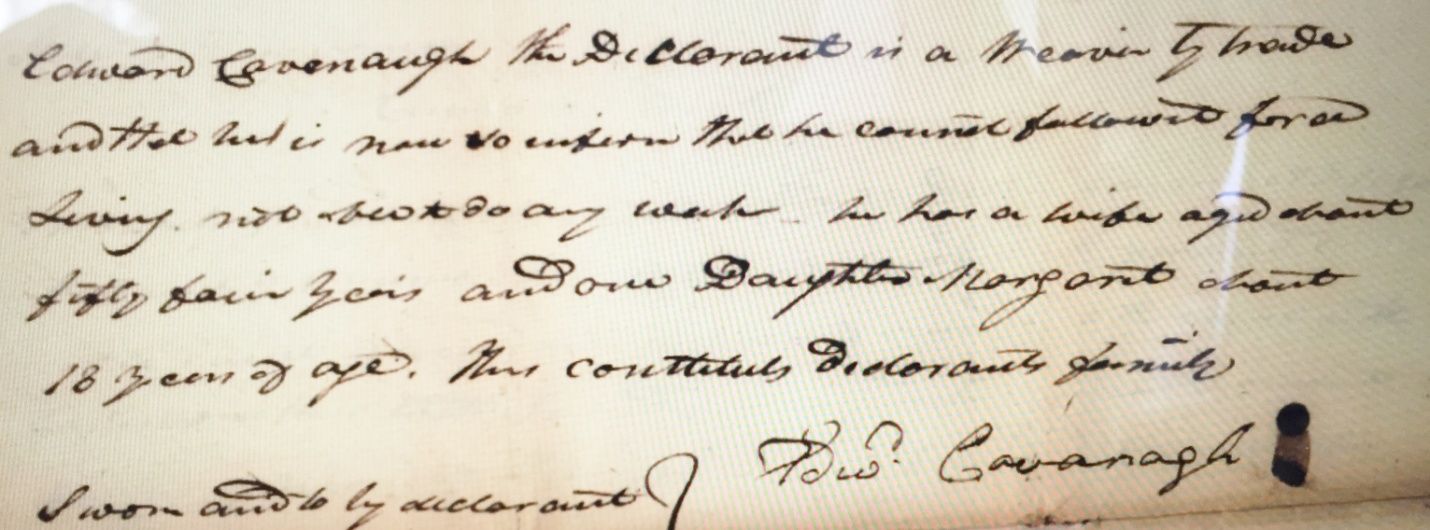In 1818, Edward Cavenaugh, a weaver living in Allen Township, Cumberland County, applied for a pension before Jacob Hendel, Judge of the Court of Common Pleas of Cumberland County. He stated that about the first of July 1775 he enlisted as a private soldier in the command of Captain Matthew Smith at Lancaster in the First Regiment of Pennsylvania riflemen for one year “if not discharged earlier.” He then marched with the company to Prospect Hill near Boston, Massachusetts where he joined the said regiment.
They were then instructed to go on an expedition under the command of Col. Benedict Arnold. On route, they met with no opposition from the enemy “but were subjected to suffer extreme hardships and privations.” When they arrived in Quebec, General Montgomery took command of all the American troops there. During the attack on Quebec, Cavenaugh was in the division headed by Col. Benedict Arnold in “the storming of the Lower town at Palace gate.”
“That after making a break in the wall and entering the city, the three companies,” and others, were taken captive. After being captive for about ten days the commanding officer of the British forces said the Americans could either enter the British service or “submit to close confinement in the Dungeon until vessels should arrive from England for the purpose of taking them to be tried for treason.” Cavenaugh and the rest of the men agreed and enlisted in the British army “until a reinforcement should arrive from England where every man who so enlisted was to be sent back to his particular place of birth.” Cavenaugh said he was born in Dublin, Ireland.
Cavenaugh and three other men deserted from British service two months after their enlistment. “The morning after their desertion, (Cavenaugh) was taken before Col. Arnold who succeeded to the command after the fall of General Montgomery. That Arnold examined Cavenaugh and gave him a pass and ordered him to join his regiment in Hartford, Connecticut,” and he entered the company commanded by Captain Loudon in the First Pennsylvania Regiment. He continued to serve in said regiment until he was discharged in the latter part of the month of June 1776. He had lost his discharge (papers) long since.
Cavenaugh said that “by reason of his reduced circumstances in life he is in need of assistance from his country for support, and that he hath no pension heretofore allowed him by the law of the United States.” 1 He was granted a pension of $8 per month.
In April 1820, Cavenaugh again applied for a pension. He was 70 years old and residing in Cumberland County. Cavenaugh reiterated his Revolutionary War service. His pension application included a schedule of his real and personal property which consisted of “one cow, one calf, two pigs, a hog, one ten-plate stove, one loom and two gears, some small articles of household furniture not worth more than six or eight dollars, and one half of a vacant lot in Dillstown, York County, Pennsylvania worth about twenty dollars.”2
Cavenaugh stated that he was a weaver by trade but was now so infirm that he could not work for a living. He had an aged wife, 54 years old, and an 18-year old daughter named Margaret.
Cavenaugh lived for another 26 years and died in 1842. The Carlisle Herald and Expositor, ran the following obituary in its December 28, 1842 issue.
“At Dillstown, on Wednesday the 14th instant, Mr. Edward Cavenaugh, at the advanced age of 96 years. Everybody, almost, has heard tell of “honest Ned Cavanaugh.” The deceased was a gallant soldier of the Revolution from its commencement to its close and was one of the daring spirits who accompanied the expedition of Arnold to Quebec, in the winter of 1775, and participated in the attack which cost Gen. Montgomery his life. The late Judge Henry, in his account of that trying campaign, makes honorable mention of the daring feats of his fellow soldier, Cavanaugh, and was the first, we believe, who gave him the title above-mentioned by which he has been so generally known for many years. Old Ned was emphatically an honest man, and as such commanded the respect and esteem of all who knew him. Peace to his ashes.”
Edward Cavenaugh is buried in the Dillsburg Cemetery about 12 miles from Carlisle.


